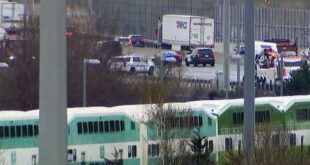kʷiisaḥiʔis, or Brave Little Hunter, has been stuck in a B.C. lagoon alone for weeks since her mother died

Rescue of trapped killer whale calf underway
2 hours ago
CBC reporter Joel Ballard tells BC Today host Michelle Eliot about Friday's rescue operation near Zeballos, B.C.
Members of the Ehattesaht First Nation, Fisheries and Oceans Canada (DFO) and the Vancouver Aquarium have begun a rescue operation to move a stranded killer whale calf out of a remote Vancouver Island lagoon and into open water, the nation says.
DFO also confirmed in a statement the rescue is underway, but said it wouldn't provide updates until it's complete.
The two-year-old female transient killer whale, known as kʷiisaḥiʔis (Brave Little Hunter), has been stuck in the tidal lagoon near the village of Zeballos, B.C., since March 23, when its pregnant mother became trapped by the low tide and died on a rocky beach.
Details of the operation are limited, but Paul Visser with the Ehattesaht First Nation confirmed with CBC News that the rescue is currently underway.
He said the rescue team met at 5 a.m. PT Friday.
"[They] set off with good hearts and intention for the day's work," he said.
Visser said the rescue will likely last all day.
WATCH | Planning for a complex rescue:

Efforts ramp up to help baby orca stranded off Vancouver Island
20 hours ago
For nearly three weeks, an orca calf has been stuck in a remote lagoon off Vancouver Island. Crews are working around the clock to prepare for a complex rescue operation that will hopefully reunite the whale with her pod.
Calf to be transported in sling
For weeks, experts — including First Nation members, DFO marine mammal experts, whale scientists and boat and machine operators — have gathered in the small community of about 200 people to plan how to free the killer whale calf.
They have spent much of the past week in meetings preparing for a rescue attempt.
The DFO said in a release that it was planning to use a sling to lift kʷiisaḥiʔis out of the lagoon and transport the calf to open water.
On Thursday, rescuers were practising lifting the sling with an excavator and transporting to the bed of a truck.
DFO has said the road to the lagoon will be closed during the rescue to protect the orca's safety.
The Ehattesaht First Nation said in a release that the whale's health is at the forefront of all decisions.
"When we look at [kʷiisaḥiʔis] from a distance we can't really see too many changes but her calls are certainly the hardest part of the past two weeks," the release said.
"They are sorrowful and as they go unanswered, your heart sinks."
Past rescue attempts to free the orca have unfortunately been unsuccessful.
Previously, rescuers tried to coax the whale out of the lagoon by using recorded killer whale vocalizations.
On March 28, around 10 boats attempted to herd the orca by using oikomi pipes, which are made out of metal and create a loud noise underwater when struck. But to escape the lagoon, the orca would have to pass over the same sandbar where its mother was beached and died.
At one point, DFO even considered lifting kʷiisaḥiʔis out of the lagoon via helicopter, but it has since abandoned that plan.
ABOUT THE AUTHOR
Joel Ballard is a reporter with the CBC in Vancouver. You can reach him at joel.ballard@cbc.ca
With files from Melody Jacobson
*****
Credit belongs to : www.cbc.ca
 MaharlikaNews | Canada Leading Online Filipino Newspaper Portal The No. 1 most engaged information website for Filipino – Canadian in Canada. MaharlikaNews.com received almost a quarter a million visitors in 2020.
MaharlikaNews | Canada Leading Online Filipino Newspaper Portal The No. 1 most engaged information website for Filipino – Canadian in Canada. MaharlikaNews.com received almost a quarter a million visitors in 2020.







